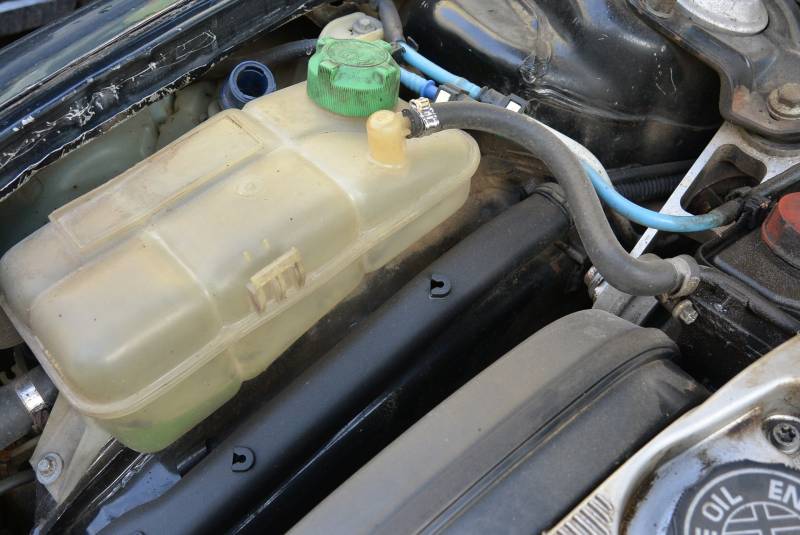Quick Navigation

Nothing sets a car owner on panic than a smell of coolant emanating from their vehicle. Besides indicating a malfunction, it may serve as an indicator that your car may overheat anytime.
The panic manifests when you inspect your vehicle for a leak and fail to spot one. However, the smell of anti-freeze without noticeable leakages is not always a reason to cause worry.
Often, this indicates a minor leakage, which costs little to fix. However, it may also indicate a more extensive internal leakage, which requires professional assistance.
This article tackles various causes of unnoticed antifreeze leakage to help you easily troubleshoot the problem.
The Purpose Of Antifreeze
When burning fuel to produce the energy to move the crankshaft, the engine produces heat. When heat energy accumulates, the engine fails to realize optimal combustion, resulting in loss of fuel.
The engine is fitted with a cooling system that curbs heat buildup, ensuring optimal performance. The cooling system carries the engine’s heat and emits it to the surroundings to navigate this issue. However, water is suboptimal in this mechanism owing to its heating and cooling points.
As such, antifreeze is added to water to increase its heating point and lower the cooling point. The solution can conduct heat from the engine and dissipate it in the radiator, thus maintaining optimal engine temperatures.
The emulsion also withstands shifts in temperature without expanding and contracting, thus ensuring the longevity of your piping.
Why Do You Detect Antifreeze Smells?
The smell of antifreeze is an alarm indicating issues with your cooling system. As such, the smell alerts you to troubleshoot problems before they escalate.
This sweet smell is produced when coolant leaks from your system and falls on the hot engine. Owing to the high temperature, antifreeze evaporates, and produces the fumes that herald a visit to your mechanic.
The Smell Of Coolant With No Leakage
Once you smell the coolant, rest assured there is an issue with your engine cooling system. However, this often implies that the leakage is in its early stages, thus should not affect your vehicle’s performance.
While this implies a lesser cost of repair, it also implies that you will spend more time tracing the leakage. However, this should not worry you as you can drive to your mechanic before your engine fumes up.
Sources of coolant leakage
Leaking Ducts
After some years of service, the pipes connecting your engine to the radiator may rust and develop leakages. Also, poorly tightened clamps may result in a coolant fissure due to the cooling system’s pressure.
This will develop as a faint smell and increase in magnitude as the rapture grows.

Radiator Leakage/ Cracked Coolant Reservoir
In some cases, a coolant leak may be due to a damaged radiator. Unlike other components, the radiator costs a substantial amount of time and money to repair.
A damaged radiator is often indicated by bubbling within the coolant in the indicator. However, an internal leakage may take a long to pinpoint without the help of dedicated machines.
Another common cause of leaking coolant that you cannot spot is a cracked reservoir. While this may be hard to monitor by checking the coolant level, it yields a regular smell of antifreeze depending on the interval of drips.
Faulty Radiator Cap
The radiator cap is among the culprits for coolant leakage within your vehicle. Over the time of use, the threads and seal on your radiator cap may wear out.
As a result, the cap gives in to the pressure contained in the cooling system. As a result of this, coolant drips on various components in your bonnet, leaving a stain of coolant.
Broken Gasket
Among the hardest sources of leakage to trace is a broken gasket head. Unlike other damages, a broken gasket drips the coolant into the engine. As a result, it causes a smoky fume to be emitted from the exhaust pipe.
This may be hard to discover unless you observe your car when revving it on neutral gear. It is also vital to note that the only remedy for a broken gasket is gasket replacement.
Damaged Heater Core
The heater core is responsible for dissipating the engine cooling system’s heat into the driver’s cabin. In case of a malfunction, the heater core emits coolant in your cabin, resulting in condensation on your windows.
Unlike other causes, this may result in a coolant puddle on your cabin floor, thus making it unbearable for the occupants. To manage this, you can bypass the heater core, thus reducing the loss of coolant.
However, bypassing your heater core should be a temporary fix. This is because it may result in the defroster’s malfunction, causing severe damage to your vehicle.
Tips For Maintaining A Healthy Engine Cooling System
While faults are commonplace in the engine cooling system, there are various steps that you may take to reduce their occurrence. Among the approaches to control coolant leakage include:
- Filling your coolant to the indicated mark – since the engine cooling system operates under pressure, it is essential to maintain the thresholds that it is meant to function under. When you surpass the coolant’s indicated point, you cause excess pressure to buildup, causing cracks in various system components
- Properly mixing antifreeze and water – As stated earlier, a 50/50 ratio of antifreeze to water is optimal when replacing coolant. Besides curbing the expansion and contraction of water, it ensures your engine cooling system’s optimal operation.
- Tightening coolant hosing clamps – When troubleshooting coolant leakages, poorly clamped hoses should be your first guess. Owing to the cooling system’s high pressure, coolant may escape through the spaces on your connections and give you a headache of tracing the leakage. For this, check connecting to the engine and your radiator and replace any damaged clamps.
- Regular maintenance – by visiting your mechanic regularly, you can identify various issues before they manifest. Your mechanic can also check your cooling system’s efficiency, thus performing a coolant flash if necessary.

With comprehensive experience in writing exceptional quality articles and blogs about cars and related stuff, Daniel is one of the finest bloggers and a hardcore car lover we have. He is an ASE certified technician with an across-the-board experience of 10 years in the industry. He could not help tinkering with anything he got his hands on from a young age, which led to his remarkable career in the automotive repair industry.
When he is not under any hood, you can find him on the water or in the woods to pursue his passion for hunting and fishing. He has been writing for multiple sectors and is a regular contributor to several publications.
He currently owns a Nissan 300ZX TT and a Pearl Yellow but plans to upgrade it to 550 HP. His favorites include the Koenigsegg CCX and Lamborghini Diablo 6.0 VT, but for him, the Ferrari 360 Spider is one of the sexiest cars that exists to date.
Being an avid world traveler, he has spent most of his time analyzing the automotive markets, latest technology, and local favorites to enhance his knowledge base. He is currently living in North Caroline, where it’s all about food and coffee and, of course, cars.






